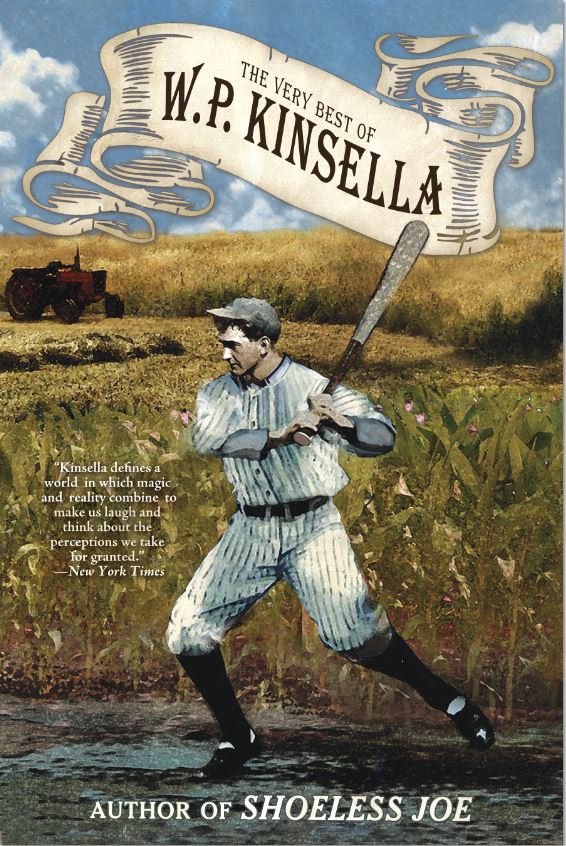 |
| Cover art by Thomas Canty |
If you read this blog fairly regularly, you'll recall my post earlier in the month when I wrote about purchasing the Xcanex Professional Book and Document Scanner by piQx imaging. In that post I mentioned a huge scanning project I had begun working on at the time, which is why I was in a bit of a kerfuffle over scanners -- and the fact that my go-to scanner for nearly 10 years no longer worked with OmniPage Pro and Windows 7.
That scanning project is short story collection The Very Best of W. P. Kinsella , forthcoming in 2015 from Tachyon Publications.
, forthcoming in 2015 from Tachyon Publications.
And the project is indeed huge: approximately 138,000 words of fiction, all of which has to be scanned, then cleaned up and formatted, and finally copy edited.
If you've seen the movie Field of Dreams (1989), starring Kevin Costner, then you've experienced a wee taste of W. P. Kinsella, who wrote the novel Shoeless Joe (1982), upon which the movie is based. And Kinsella's novel is an expansion of his 1979 short story, "Shoeless Joe Jackson Comes to Iowa" -- which is included in this Very Best of collection. In the story, a corn farmer in Iowa hears a voice:
Two years ago at dusk on a spring evening, when the sky was a robin's-egg blue and the wind as soft as a day-old chick, as I was sitting on the verandah of my farm home in eastern Iowa, a voice very clearly said to me, "If you build it, he will come."
The voice was that of a ballpark announcer. As he spoke, I instantly envisioned the finished product I knew I was being asked to conceive. I could see the dark, squarish speakers, like ancient sailors' hats, attached to aluminum-painted light standards that glowed down into a baseball field, my present position being directly behind home plate.
The "he" in "he will come" is Joseph Jefferson Jackson, the "Shoeless Joe Jackson" in the title, one of the greatest baseball outfielders of all time -- who had passed away in 1951, years (and years) before our Iowa corn farmer heard that voice. But if our farmer builds that ballfield, he will come. [Note: Shoeless Joe had been mired in the Black Sox Scandal after the Chicago White Sox lost to the Cincinnati Reds in the 1919 World Series; Joe and seven other teammates were banned for life from baseball the following year.]
There are a few other baseball stories in this collection, but you don't need to know anything about baseball to enjoy these tales: baseball merely serves as a backdrop to these stories, which are about life and the human condition, often with a bit of the "fantastic" thrown in. My favorite story in the collection is "K Mart" -- but don't let the title fool you: it's the story of lost childhood love, nostalgia, and survival, all amidst the backdrop of a neighborhood dirt-lot baseball game, a game that seemed endless (to the children playing it), but only lasted throughout the summer months.
W. P. Kinsella is also well-known for his "First Nation" stories about the indigenous Cree on the Hobbema Reserve near Edmonton, Canada. These stories reflect the Cree's destitute and disadvantaged culture, yet add an element of humor by exploring the convoluted situations (and shenanigans) they get into trying to survive in a world dominated by white people. But even with the element of humor, there is a sadness to all of these stories. What is especially delightful about these stories is that Kinsella's characters -- Silas (the narrator), Frank Fencepost, Mad Etta, Bedelia Coyote, Sadie One-wound, and Rufus Firstrider, to name just a few -- appear in all the stories. By the time you finish reading this collection, you'll certainly consider them acquaintances, if not friends. In "Beef," Bedelia Coyote determines that a treaty the Cree signed with the Canadian government in the 1800s is still valid, and she files the necessary paperwork so that the reserve receives financial compensation. But Frank Fencepost has a better scheme in mind: he hijacks the paperwork and requests the government honor the compensation put forth in the original treaty: cattle -- figuring he can make more from the cattle than the money the government was offering. The title of the story, "Beef," says it all.
Other stories include the ability to transcend art, literally ("The Grecian Urn"); removing deceased family members, over time, from the family portrait ("Out of the Picture"); gangs, a bikers' bar, and undercover cops ("King of the Street"); and a restaurant where one never gets served ("Waiting on Lombard Street"); and many more. Thirty-one stories in all. Here's the complete contents list, in alphabetical order:
The Alligator Report—with Questions for Discussion
Beef
Brother Frank’s Gospel Hour
Distances
Do Not Abandon Me
Doves and Proverbs
Dr. Don
The Firefighter
First Names and Empty Pockets
The Fog
The Grecian Urn
How I Got My Nickname
How Manny Embarquadero Overcame and Began His Climb
to the Major Leagues
The Indian Nation Cultural Exchange Program
The Job
K Mart
King of the Street
The Last Surviving Member of the Japanese Victory Society
Lieberman in Love
The Lightning Birds
The Lime Tree
Marco in Paradise
The Night Manny Mota Tied the Record
Out of the Picture
Punchlines
Risk Takers
Searching for January
Shoeless Joe Jackson Comes to Iowa
Truth
Waiting on Lombard Street
Wavelengths
"Few writers can match Kinsella's ability to establish tone, character, and a complete reality in just a few paragraphs, then sweep the reader into his imagined world."—Library Journal
"[Kinsella] uses baseball not so much as a metaphor, but as a familiar starting place for exploring, with pinpoint control, the human psyche."—Booklist

No comments:
Post a Comment